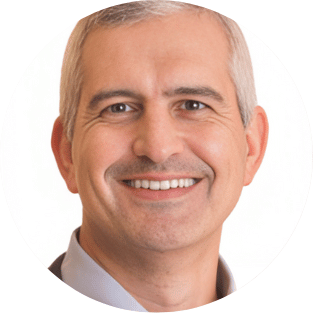
Takeda at UEG Week 2024: Marcelo Freire from Takeda in an Enlightening Conversation with PharmaShots
Shots:
-
Recently, Takeda shared 32-week interim results from the VERDICT study, which evaluated Entyvio (vedolizumab) for the treatment of patients with ulcerative colitis (UC)
-
Entyvio achieved a stringent endpoint of disease clearance, a new concept in UC clinical research, which is a combination of clinical, endoscopic, and histologic remission
-
Today at PharmaShots, we are joined by Marcelo Freire from Takeda to discuss Takeda’s presentation at UEG Week 2024 and the significance of these groundbreaking findings.
Saurabh: VERDICT has successfully met the stringent endpoint of disease clearance. So give us an overview of this endpoint and whether were there any challenges faced during this study.
Marcelo: While there is currently no cure for inflammatory bowel disease (IBD), including ulcerative colitis (UC), as treatment has evolved so have treatment goals, aiming to modify the course of the disease and prevent progression. Disease clearance – a combination of clinical, endoscopic, and histologic remission – is a new concept in UC clinical research. Achieving these three components might help to prevent the progression of UC in the long-term and complications. Takeda is working to explore these new frontiers. The VERDICT study is the first prospective study to determine the optimal treatment target in the management of UC. It is designed to look at long-term outcomes (over 80 weeks), examining the optimal treatment target which potentially can change the course of the disease. Results may help to select optimal treatment targets in clinical practice, drug development and future evidence-based guidelines. The study suffered delays as we were recruiting during the pandemic, however we were able to resume a strong recruitment pace in the last two years and now the study is fully recruited.
Saurabh: Can you please start by sharing the results of the P-IV VERDICT trial, presented at United European Gastroenterology (UEG) Week?
Marcelo: New 32-week interim data from the VERDICT study, showed that more than half of the patients (53.3%, n = 112/210) with moderate to severe UC evaluated for disease clearance achieved this target at 32 weeks with Entyvio® (vedolizumab). Improved target achievement was observed in patients who had not previously been exposed to biologic therapy.
-
A further improvement at 32 weeks compared with 16 weeks across all target groups was shown.
-
At week 16, 41% (n= 86/212) of patients with moderate to severe UC evaluated for disease clearance had achieved this target with Entyvio.
These 32-week interim data continue to support the efficacy of Entyvio in achieving the stringent endpoint of disease clearance.
Saurabh: Please provide the details of vedolizumab (MOA, ROA, formulation, etc) of the VERDICT trial for the treatment of ulcerative colitis (UC).
Marcelo: In the VERDICT study, patients follow a treatment algorithm involving the early introduction of Entyvio (300mg), administered intravenously (IV). Entyvio is a biologic therapy. It is a humanized monoclonal antibody designed to specifically antagonize the alpha4beta7 integrin, inhibiting the binding of alpha4beta7 integrin to intestinal mucosal addressin cell adhesion molecule 1 (MAdCAM-1), but not vascular cell adhesion molecule 1 (VCAM-1). MAdCAM-1 is preferentially expressed on blood vessels and lymph nodes of the gastrointestinal tract. The alpha4beta7 integrin is expressed on a subset of circulating white blood cells. These cells have been shown to play a role in mediating the inflammatory process in UC and Crohn’s disease (CD). By inhibiting alpha4beta7 integrin, Entyvio may limit the ability of certain white blood cells to infiltrate gut tissues. Entyvio IV is approved in over 75 countries and Entyvio subcutaneous administration (SC) is approved in over 50 countries around the world. A decade after its first approval, its positive benefit-risk profile is supported by robust clinical evidence and ten years’ worth of data from everyday clinical practice, amounting to over 1.3 million patient years of treatment experience globally.
Saurabh: What was the study design for the P-IV study (VERDICT)?
Marcelo: The VERDICT study is a randomized controlled trial (NCT04259138), aiming to determine the optimal treatment target in moderate-to-severe active UC. Patients are allocated to three treatment targets:
-
Corticosteroid-free (CSF) symptomatic remission
-
CSF symptomatic remission and endoscopic remission
-
CSF symptomatic remission, endoscopic remission and histologic remission, also defined as disease clearance
Saurabh: Can we talk about more molecules being assessed in GI space (non-oncology)?
Marcelo: We will not stop striving to innovate. Building on the progress already made, we believe that more can be done to support patients in different stages of their IBD journey and we continue to seek solutions that may help to address remaining unmet patient needs and growing IBD prevalence. This includes seeking solutions that may help to address the need for timely intervention in IBD, reach new heights in terms of treatment efficacy and modify the course of disease over the long-term. We are working with patients, healthcare professionals and the scientific community to explore new frontiers and conduct new studies, with the hope of bringing our existing medicines to more people and delivering new treatment options in IBD and beyond.
- Additionally, Takeda currently has five molecular entities in Phase 2 and Phase 3 development in the Gastrointestinal space, including:
- Zasocitinib (TAK-279) for the treatment of IBD, and also psoriasis and psoriatic arthritis. It is an investigational, oral allosteric tyrosine kinase 2 (TYK2) inhibitor with next generation selectivity. It has more than 1.3 million–fold greater selectivity for TYK2 as compared with JAK1, JAK2 and JAK3, which could maximize TYK2 inhibition with no impact on JAK1/2/3 signaling. Selective allosteric inhibition of TYK2 may be a promising therapeutic approach to target immune-mediated inflammation while potentially decreasing the risk of toxicity associated with non-selective JAK inhibition.
- Fazirsiran (TAK-999) for the treatment of alpha-1 antitrypsin deficiency (AATD)-associated liver disease. Fazirsiran is a potential first-in-class investigational RNA interference (RNAi) therapy designed to reduce the production of mutant alpha-1 antitrypsin protein (Z-AAT). Z-AAT accumulation is believed to be the cause of progressive liver disease in patients with AATD. Reducing production of the inflammatory Z-AAT protein is expected to halt the progression of liver disease and potentially allow the liver to regenerate and repair. There are currently no approved pharmacologic treatments for AATD associated liver disease.
- Takeda is also advancing research into celiac disease, for which there are no approved treatments and the only management option currently available to patients is a lifelong adherence to a strict gluten-free diet. Despite this, up to 30% of patients still have ongoing symptoms and intestinal damage. Takeda has three investigational molecules currently in Phase 2 development, each targeting distinct points within the disease pathophysiology:
- TAK-227 – a selective, oral small molecule inhibitor of tissue transglutaminase (TG2), an enzyme that generates immunogenic gluten peptide fragments upon the breakdown of gluten in the stomach and intestinal tissue. This program is in development in partnership with Zedira and Dr Falk Pharma.
- TAK-062 (zamaglutenase) – an oral, computationally engineered enzyme (transglutenase) designed to degrade the immune-reactive parts of gluten and improve its digestion in the stomach.
- TAK-101 – an immune-modifying intravenously administered nanoparticle containing gliadin proteins designed to serve as a tolerizing agent that tempers the aberrant immune response in celiac disease.
Saurabh: Can you tell us what the pipeline holds for other Rare Indications?
Marcelo: In terms of rare gastrointestinal disease, Takeda is committed to advancing research into the inherited condition AATD-associated liver disease. As mentioned earlier, Takeda is currently investigating Fazirsiran (TAK-999) for the treatment of this burdensome condition, in order to address the high unmet patient need.
Image Source: Canva
About the Author:

Marcelo Freire
Marcelo Freire has been at Takeda for more than 12 years, currently serving as Vice President and Global Medical Affairs Head for Gastroenterology, following posts as the Head of Medical Affairs in the Europe and Canada Region, Emerging Markets and in Brazil. Prior to this, he held medical positions at Novo Nordisk, Nestlé and Pfizer in Brazil. Marcelo holds a medical degree from the Federal University of Uberlândia, Brazil and completed his training in Pediatrics at the Federal University of Sao Paulo, Brazil.
Related Post: Takeda at AAAAI 2024: Salomé Juethner highlights P-IV Results from ENABLE and EMPOWER Studies
Tags

Saurabh is a Senior Content Writer at PharmaShots. He is a voracious reader and follows the recent trends and innovations of life science companies diligently. His work at PharmaShots involves writing articles, editing content, and proofreading drafts. He has a knack for writing content that covers the Biotech, MedTech, Pharmaceutical, and Healthcare sectors.














